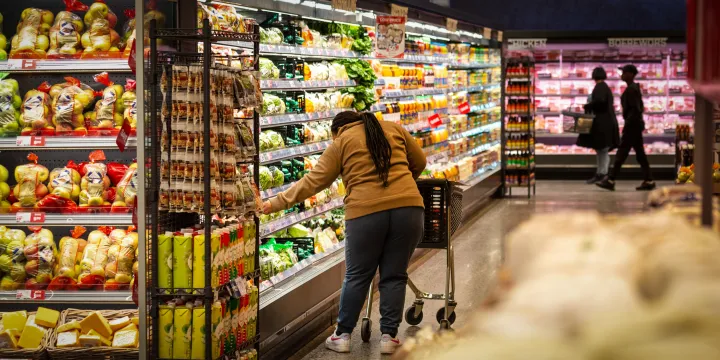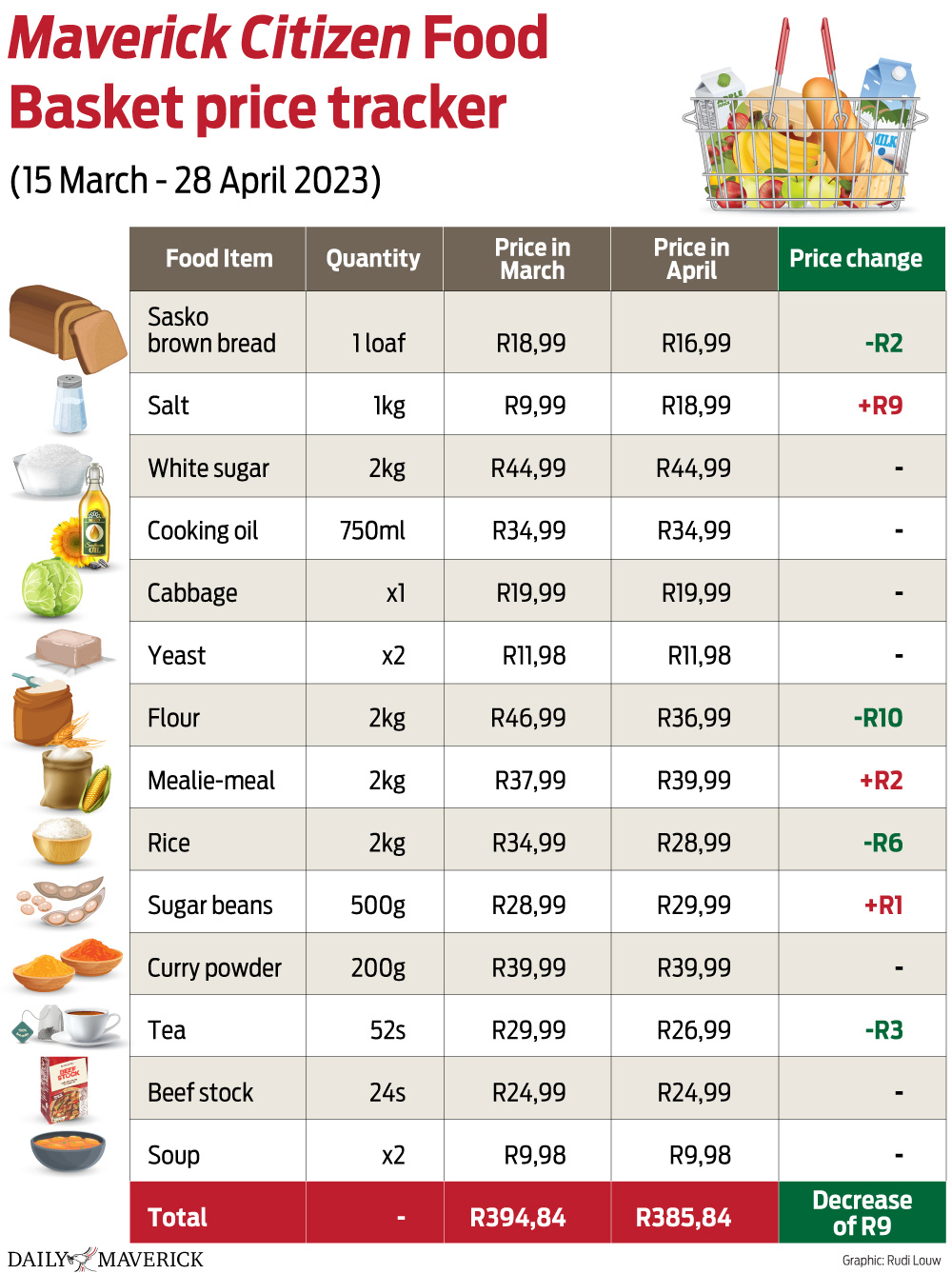FOOD BASKET CHECK
SA households forced to switch to cheaper, less nutritional meals due to heavy price burden

‘When the prices of core foods increase, there is less money to secure other important mostly nutritionally rich foods, which are essential for health and wellbeing and strong immune systems,’ reads the Pietermaritzburg Economic Justice & Dignity Group’s latest Household Affordability Index.
The price of flour, rice and brown bread decreased by a couple of rands in April and although these goods are staples they do very little to support nutritionally balanced diets. Meanwhile, more and more South Africans are cutting back on vegetables, fruits and good oils.
The cost of a household’s food basket has decreased slightly from March but it’s still unaffordable for Social Relief of Distress (SRD) grant recipients.
The Pietermaritzburg Economic Justice & Dignity’s Household Affordability Index (HAI) food basket of 44 essential goods now costs more than R5,000 and the burden of high food prices for middle-income earners is heavier as you go down the pay scale.
“The cost of the foods prioritised and bought first in the Household Food Basket is important. The core foods are bought first and these foods ensure that families do not go hungry whilst ensuring that meals can be cooked,” reads the report.
“When the prices of core foods increase, there is less money to secure other important mostly nutritionally rich foods, which are essential for health and wellbeing and strong immune systems (viz. meat, eggs and dairy which are critical for protein, iron and calcium; vegetables and fruit which are critical for vitamins, minerals and fibre; and maas, peanut butter and pilchards, good fats, protein and calcium essential for children). The data show that the core foods contribute 55% of the total cost of the Household Food Basket,” it continues.
Read more in Daily Maverick: A serious proposal to overcome child hunger… but will we choose it?
The HAI report said: “Month-on-month: The average cost of the foods prioritised and bought first in the household food basket increased by R30.43 (1.1%) from R2,714.97 in March 2023 to R2,745.40 in April 2023. Year-on-year: The average cost of the foods prioritised and bought first in the household food basket increased by R331.1 (13.7%) from R2,414.09 in April 2022 to R2,745.40 in April 2023.
“At an average cost of R2,745.40 in April 2023, these foods are relatively very expensive in relation to the total money available in the household purse to secure food. These foods must be bought regardless of price escalations.
“The high cost of core staple foods results in a lot of proper nutritious food being removed off the family plates. The consequences of high costs on the core foods have a negative impact on overall household health and wellbeing, and child development.”
According to Statistics South Africa, the monthly change in the consumer price index (CPI) was 1% in March, the highest since July 2022 (1.5%).
“Food and non-alcoholic beverages and transport were the main drivers behind the annual and monthly increases. Inflation for food and non-alcoholic beverages continued to accelerate, with prices increasing by 14.0% in the 12 months to March. This represents the largest annual increase since the 14.7% rise in March 2009,” said Stats SA in April 2023.
Stats SA said that in March the categories of milk, eggs and cheese; sugar, sweets and desserts; fruit and vegetables; and “other food products” experienced upward inflation pressure. The milk, eggs and cheese product group saw its annual increase reaching 13.6% from the recent low of 3.7% in April 2022.
“The reading in March is the highest annual increase since February 2009’s print of 13.9%. Bread and cereals, meat, oils & fats, and fish bucked the trend, recording slower growth.”
Southern Africa
The African Market Observatory (AMO) of the Centre for Competition, Regulation and Economic Development at the University of Johannesburg, summarises key trends in prices in East and southern Africa for selected staple food products.
The latest instalment of the report notes that fertiliser prices, drought and transport costs were having a negative impact on the prices of goods such as maize meal and soybeans.
“Export permit restrictions in Zambia suppress prices of maize to levels where farmers struggle to cover high fertiliser costs. Indications are strengthening the shift to El Niño later this year which typically brings drought conditions to southern Africa.
“Fertiliser prices remain at high levels, of US$900/t and more for urea, while international prices fell to below US$350/t. TradeMark Africa launched a platform to improve information and market access for women traders in East Africa. A global UN initiative to ensure that all countries are protected by early warning systems by 2027, is being fast-tracked,” said the AMO.
“Transport costs to markets play a key role, although these costs may be inflated. We consider what are efficient costs and the effects on prices. Transport costs from Zambia and Malawi to Nairobi should be no more than $120/t, especially as fuel prices are now coming down.”
Accessing grants
Meanwhile, some Social Relief of Distress (SRD) grant recipients are still struggling to access funds or are not receiving grants.
The #PayTheGrants campaign has been lobbying to help recipients access their funds.
“We have noticed that there are SRD grant claimants who receive their SRD grants via Sassa Gold Cards that have not received their April 2023 approved pay date for payment. We will enquire from Postbank and announce the response when available,” said #PayTheGrants in a statement.
The campaign has called on grant recipients to tell it of their encounters with:
- Online-only process: A person who has not been able to apply/appeal for the SRD grant because it is only online (no smartphone, no internet/data, not able to navigate websites, etc).
- Definition of income: An applicant who is declined because of “alternative income identified”, but is not working or getting a salary, and only gets support from others to survive.
- Exclusion of caregivers who receive child support grants: An applicant who is declined because of “alternative income identified”, but only receives money from the Child Support Grant.
- Low grant value: A claimant who successfully receives the SRD grant, yet believes that R350 is too low to survive on.
- Appeal process that excludes new evidence: An applicant whose appeal is rejected because they are not allowed to show proof that they are eligible.
Further details of #PayTheGrants’ call for submissions can be found here. DM/MC






















 Become an Insider
Become an Insider
Comments - Please login in order to comment.